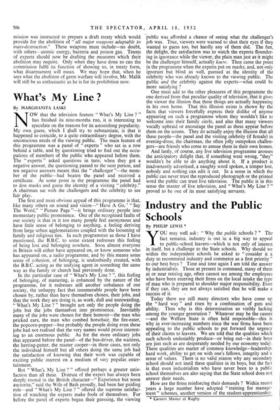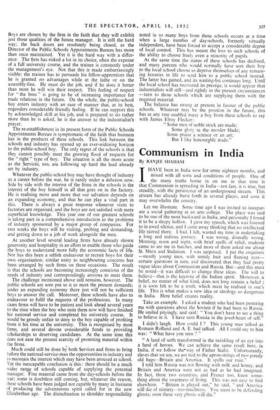Industry and the Public Schools
By PHILIP LEWIS *
YOU may well ask : "Why the public schools ? " The fact remains, industry is out in a big way to appeal to public-school leavers—which is not only of interest in itself, but a challenge to the State schools. Why should we within the independent schools be asked to "consider it a duty to recommend industry and commerce as a first priority" to our best boys ? Time and time again I am told the answer by industrialists. Those at present in command, many of them at or near retiring age, often cannot see among the employees who have been entering their firms on the local intake the type of man who is prepared to shoulder major responsibility. Even if they can, they are not always satisfied that he will make a success of it. / Today there are still many directors who have come up the "hard way" and risen by a combination of guts and ability. Then why is this determination so visibly lacking among the younger generation ? Whatever may be the causes —and the Welfare State is often held responsible—this is why in ever-increasing numbers since the war firms have been appealing to the public schools to put forward the urgency of their claims to leavers. We are told that the qualities which such schools undeniably produce—or bring out—in their boys are just such as are desperately needed by our economy today. These qualities are matter of common knowledge—leadership, hard work, ability to get on with one's fellows, integrity and a sense of values. There is no valid reason why any secondary school should not instil these qualities in its boys, but the fact is that even industrialists who have never been to a public school themselves are also saying that the State school does not answer their needs.
How are the firms reinforcing their demands ? Within recent years a large number have adopted "training for manage- ment" schemes, another version of the student-apprenticeship.
• Careers Master at Rugby. Boys are chosen by the firm in the faith that they will exhibit just those qualities of the future manager. It is still the hard way; the back doors are resolutely being closed, as the Director of the Public Schools Appointments Bureau has more than once maintained. Yet it is the hard way with a differ- ence. The firm has risked a lot in its choice, often the expense of a full university course, and the trainee is constantly under the management's eye. Not that this is made embarrassingly visible; the trainee has to persuade his fellow-apprentices that he is granted no advantages while at the lathe or on the assembly-line. He must do the job, and if he does it better than most he will win their respect. This feeling of respect for "the boss" is going to be of increasing importance for trade relations in the future. On the whole, the public-school boy enters industry with an ease of manner that, at its best, engenders considerable friendly feeling. If he can support this by acknowledged skill at his job, and is prepared to do rather more than he is asked, he is the answer to the industrialist's prayer.
The re-establishment in its present form of the Public Schools Appointments Bureau is symptomatic of the faith that business has in the products of these schools. This link between the schools and industry has opened up an ever-widening horizon to the public-school boy. The only regret of the schools is that they cannot possibly meet the growing flood of requests for the " right " type of boy. The situation is all the more acute as the Services, too, are following up hard the lead already set by industry.
Whatever the public-school boy may have thought of industry as a career before the war, he is rarely under a delusion now. Side by side with the interest of the firms in the schools is the interest of the boy himself in all that goes on in the factory. He is realising more and more that our salvation depends on an expanding economy, and that he can play a vital part in this. There is always a great response whenever visits to factories are organised, and the boys are not satisfied with mere superficial knowledge. This year one of our greatest schools is taking part in a comprehensive introduction,to the problems of industry sponsored by a major group of Companies. For two weeks the boys will be visiting, probing and demanding, and getting down to a job of work alongside the men.
At another level several leading firms have already shown generosity and hospitality in an effort to enable those who guide the boys to understand more fully the economic facts of life. Nor has this been a selfish endeavour to recruit boys for their own organisation; similar entry to neighbouring concerns has been arranged by such firms on these occasions. The result is that the schools are becoming increasingly conscious of the needs of industry and correspondingly anxious to meet them. The challenge mentioned above still remains, however. The public schools are sore put to it to meet the present demands; under an expanding economy there just will not be sufficient boys to answer the call. Moreover, these schools have also to endeavour to fulfil the requests of the professions. In many cases firms will have to be patient and look ahead several years to the time when the boy who suits them now will have finished his national service and completed his university course. It would be grossly unfair to deny to the boy capable of profiting from it his time at the university. This is recognised by most firms, and several devote considerable funds to providing scholarships to deserving candidates. At the same time this does not ease the present scarcity of promising material within the firms.
Much could still be done by both Services and firms to bring before the national-service-man the opportunities in industry and to maintain the interest which may have been aroused at school. Yet the inescapable conclusion is this : there should be a much wider range of schools capable of supplying the potential manager. Fine material came from the day-schools before the war; some is doubtless still coming, but, whatever the reason, these schools have been judged not capable by many in business of producing the adventurous spirit called for in the new Elizabethan age. The disinclination to shoulder responsibility noted in so many boys from these schools occurs at a time when a large number of day-schools, formerly virtually independent, have been forced to accept a considerable degree of local control. This has meant the loss to such schools of the ability to choose freely even a minority of pupils. At the same time the status of these schools has declined, and many parents who would normally have sent their boy to the local school choose to deprive themselves of any remain- ing luxuries in life to send him to a public school instead. The latter has gained, and its waiting-list continues long. Until the local school has recovered its prestige, it would appear that industrialists will still—and rightly in the present circumstances —turn to those schools which are supplying them with the required material.
The balance has swung at present in favour of the public schools. Whatever may be the position in the future, this has at any rate enabled many a boy from these schools to say with James Elroy Flecker : "Some men of noble stock are made: Some glory in the murder blade; Some praise a science or an art; But I like honourable trade."



































 Previous page
Previous page